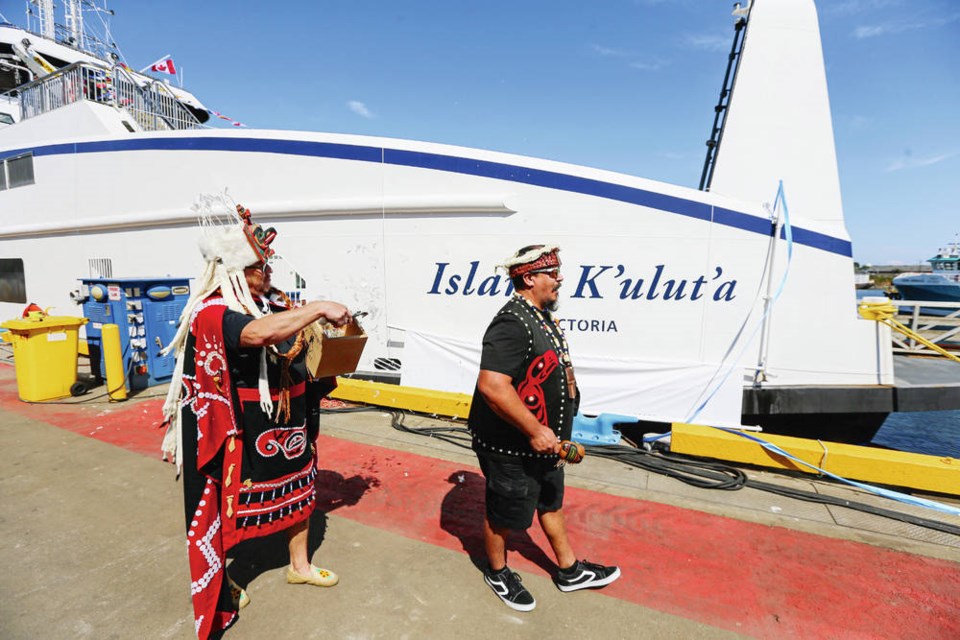Two new Island-class ferries were officially named Monday, and B.C. Ferries’ president called on the federal government to help share the $150-million cost to install charging infrastructure at terminals for the hybrid-electric vessels.
One ferry is called Island Nagalis, meaning dawn on the land, and the other is Island K’ulut’a, meaning porpoise in the Kwakwaka’wakw language.
They are the third and fourth Island-class ferries to be named. The first two are Island Aurora and Island Discovery. The fifth ferry is sailing to Victoria while the sixth is undergoing sea trials off Romania.
Officials from We Wai Kai and Wei Wai Kum spoke at the Monday naming ceremony at Point Hope Maritime on Harbour Road. Chief Chris Roberts of Wei Wai Kum in Campbell River said their protocols are to “give good blessings to these vessels and safe voyage to all passengers that will be using them and to all the staff and employees that will be working on these ferries.”
B.C. Ferries will work with the First Peoples’ Cultural Council to commission original artwork by Indigenous artists for the new ships’ interiors. This recognizes Indigenous people as stewards and the original mariners of B.C. waters.
The newly named vessels will offer a two-ship service on the Campbell River-Quadra Island route in 2022. Each can carry up to 47 vehicles and up to 400 passengers and crew. They will run initially on diesel fuel but have been designed to run on electric power once charging infrastructure is built at terminals.
“They are clean and they are quiet and they are efficient,” said Brenda Eaton, B.C. Ferry Services board chair. “They are designed to expand their battery banks so that when the shore infrastructure makes this possible these ferries will run entirely on electric power.”
All six vessels were built in Romania by Damen Shipyards Group, headquartered in the Netherlands.
They represent B.C. Ferries’ goal to pare down the number of vessel classes to five from 18. Identical ships are crucial to the organization’s ability to move them quickly and efficiently between communities, said Mark Collins, B.C. Ferries president.
The Island-class could be made up of as many as 14 ships in the future, he said. “When these ships all go to fully electric operation, it would be the largest all-electric ferry fleet in North America.”
“When we go fully electric on these ships, the ships are essentially zero emission. That’s a future right now that our planet is demanding.”
In the past seven years, B.C. Ferries has invested $800 million in low-carbon technology, Collins said, adding the six Island class ships alone represent a $300 million investment.
B.C. Ferries has identified a need for between six and eight new Island-class ships by 2032, he said.
The goal is to line up funds to install infrastructure at nine terminals, allowing the ferries to be completely reliant on electricity for power. B.C. Ferries would contribute $50 million and it has worked with the province on a carbon-credit program that would result in a “pretty significant financial contribution over the life of the vessels,” Collins said after the ceremony.
About half the cost would be covered between those partners, he said. “We need the balance to come from the federal government to make this fly.”
Collins used the naming ceremony to reiterate his desire for federal funds. His call came in the midst of a federal election campaign.
“We’ve been working with them for over a year and I would say the federal government generally has been extremely receptive. Because this lines up exactly with their priorities. Climate change is a priority, infrastructure, Canadian jobs, innovation. It’s all there. It is just taking more time than we would like,” Collins said.
“Let’s go. There’s no reason to wait.”
Once funding is lined up, it will take about four years to install the infrastructure, he said.
Next on the agenda is replacing older vessels connecting Vancouver Island and the mainland. These include the Queen of Alberni, Queen of Cowichan, Queen of Coquitlam and the Queen of New Westminster.
That project is estimated at nearly $1 billion, Collins said. “It would be the biggest capital program in B.C. Ferries’ history.”
As soon as those ferries are contracted and delivery has started, B.C. Ferries will contract for six more Island class ferries, Collins said.
Ideally five new “hopefully all-electric” larger ships would be built with capacity similar to the Spirit class ferries. The Spirit vessels are the largest in the fleet and able to carry 2,100 passengers plus 358 cars.
Construction for new ships would be funded by the company. “We have the financing. We have the borrowing capacity.”
Funding of $308 million from the federal and provincial governments allowed B.C. Ferries to come out of the pandemic in strong enough financial condition to proceed with its plans.
All five larger vessels would be ordered at once so that a shipyard can produce a series of vessels, a key factor in controlling costs.



